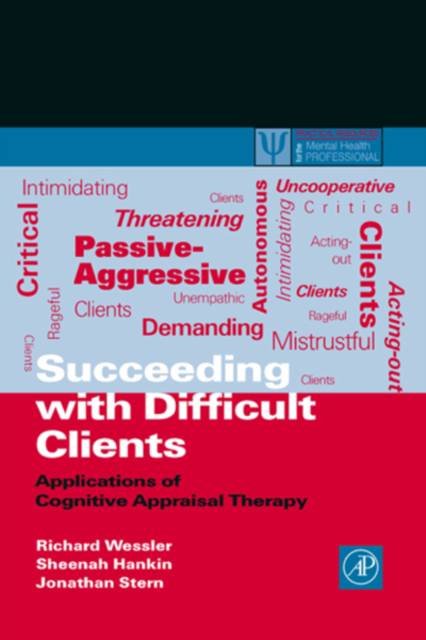
Door een staking bij bpost kan je online bestelling op dit moment iets langer onderweg zijn dan voorzien. Dringend iets nodig? Onze winkels ontvangen jou met open armen!
- Afhalen na 1 uur in een winkel met voorraad
- Gratis thuislevering in België vanaf € 30
- Ruim aanbod met 7 miljoen producten
Door een staking bij bpost kan je online bestelling op dit moment iets langer onderweg zijn dan voorzien. Dringend iets nodig? Onze winkels ontvangen jou met open armen!
- Afhalen na 1 uur in een winkel met voorraad
- Gratis thuislevering in België vanaf € 30
- Ruim aanbod met 7 miljoen producten
Zoeken
Succeeding with Difficult Clients
Applications of Cognitive Appraisal Therapy
Richard Wessler, Sheenah Hankin, Jonathan Stern
€ 147,45
+ 294 punten
Omschrijving
I know that I am doing therapy correctly and well, so why aren't some of my clients changing? Why do I feel anxious when I think about my next session with that difficult client? When psychotherapy stalls, it's time to try new ideas. The authors' experience with difficult clients -- uncooperative, hostile, uncommitted to change -- gave them a new perspective on working with therapeutic impasses. Papers describing Cognitive Appraisal Therapy have appeared in many books and journals, and now for the first time these ideas are compiled into a single volume. Heavily influenced by the psychotherapy integration movement and in a radical departure from conventional cognitive-behavior therapy, they see motivation in terms of affect and attachment rather than cognitive schemas, and resistance and setbacks as the result of emotional setpoints. Practitioners from all corners of the psychotherapy landscape will be able to integrate Cognitive Appraisal Therapy into their therapeutic approaches to help them work successfully and confidently with difficult clients as individuals, as couples and in groups.
Specificaties
Betrokkenen
- Auteur(s):
- Uitgeverij:
Inhoud
- Aantal bladzijden:
- 340
- Taal:
- Engels
- Reeks:
Eigenschappen
- Productcode (EAN):
- 9780127444703
- Verschijningsdatum:
- 1/07/2001
- Uitvoering:
- Paperback
- Formaat:
- Trade paperback (VS)
- Afmetingen:
- 155 mm x 227 mm
- Gewicht:
- 467 g

Alleen bij Standaard Boekhandel
+ 294 punten op je klantenkaart van Standaard Boekhandel
Beoordelingen
We publiceren alleen reviews die voldoen aan de voorwaarden voor reviews. Bekijk onze voorwaarden voor reviews.











